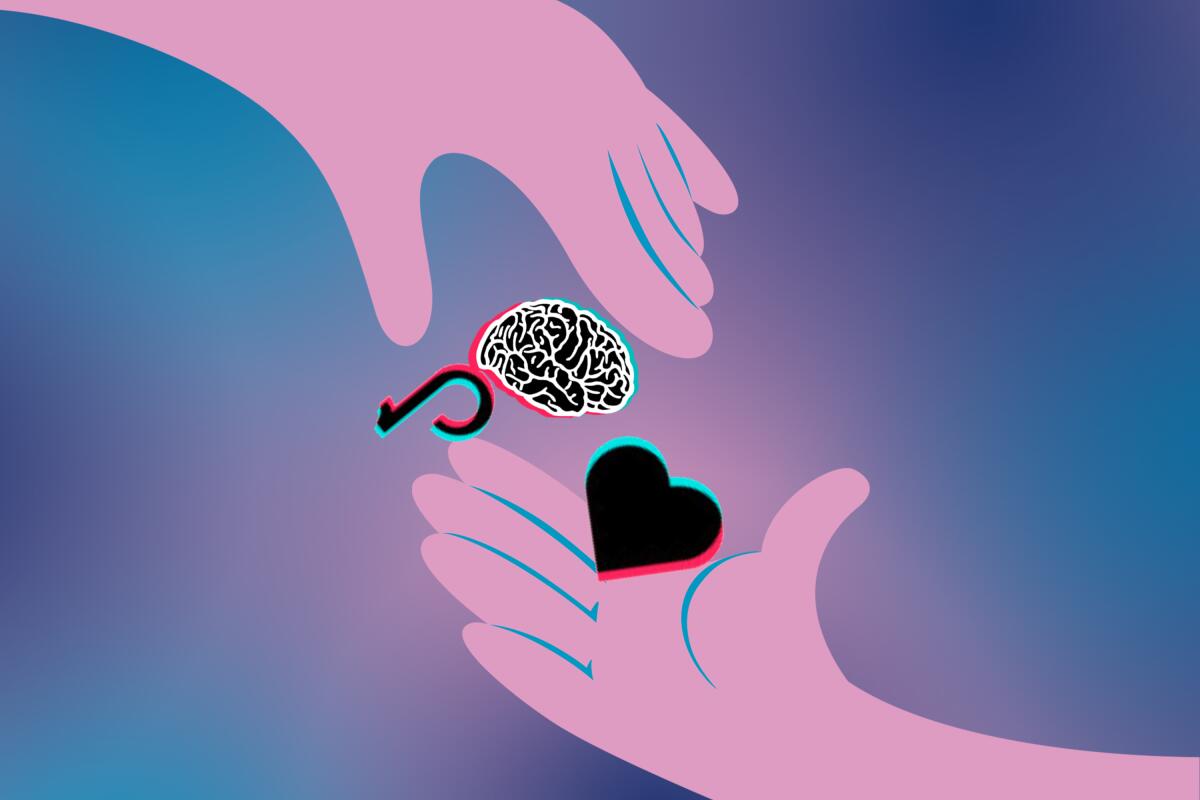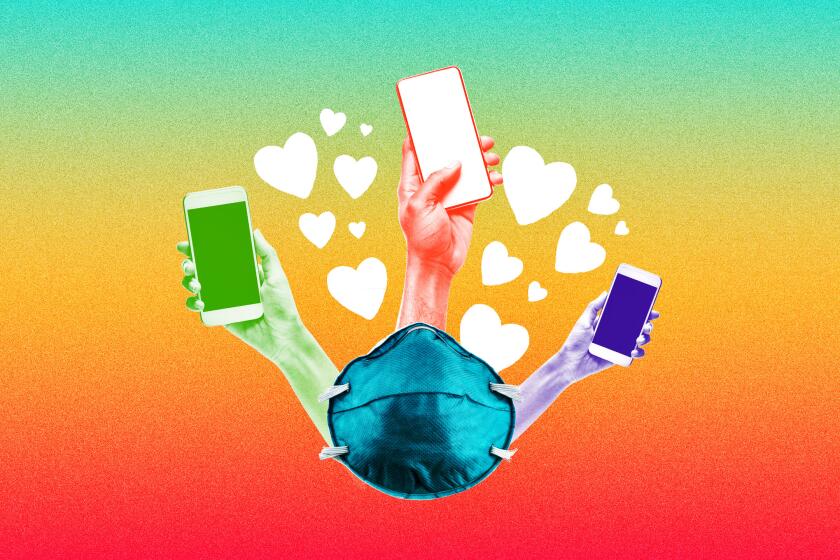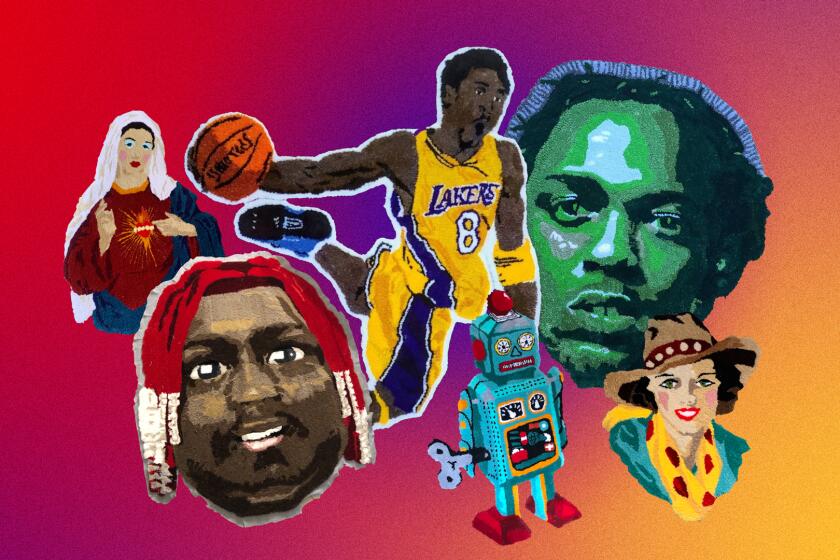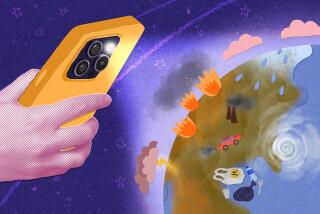My mom sent me to TikTok therapy — and it kind of ... worked?

- Share via
My mom got on TikTok before I did. I wish I could pretend like this was some big shock — my Gen X mom scrolling with the likes of Gen Z! — but it wasn’t. She’s always been a young soul, unafraid of trying new things, and she has pushed me, her 26-year-old daughter, to do the same. In other words: She’s not a regular mom, she’s a cool mom. Joining TikTok in her 40s just made sense.
This was her first experience on any social media platform. She wasn’t interested in keeping up with the drama of her childhood friends on Facebook or following celebrity chatter on Instagram. TikTok was different. There, she felt like she could learn. There were real (and amateur) experts in every field sharing their expertise. And because she’s my mom, who never does anything for just herself, I know she was thinking that, vicariously, I could learn too.
Dating coaches and matchmakers say business is booming and new clients are more flexible and more intentional about finding a partner.
It wasn’t long before I caught her humming along to Doja Cat’s “Say So” or James Blake’s version of “Godspeed.” She started saying things like “I saw that on TikTok!” and sending me one-pot vegetarian recipes; places in L.A. where I could find candles, incense and crystals; or life hacks she thought would make my world easier. But as the pandemic changed the world — and changed me — the TikToks my mom sent changed too.
Saying that “the last year has been hard on everyone” at this point feels like saying “water is wet.” (Like, yeah ...) But those of us for whom mental health was already a daily negotiation pre-pandemic are still processing just how hard it was. Quarantine felt like a push over the edge. It exposed the falsehood that if you just stayed busy, met your deadlines, watched comforting reruns of the same HBO series you’d seen several times that your thoughts, your unaddressed traumas, your unhealed wounds might never catch up with you. Mine did.
It wasn’t just the anxiety or depression I’d played tug-of-war with for years. My thoughts became loud and intrusive, playing on a relentless loop in my head. I didn’t feel like myself anymore. I didn’t feel like a person at all.
My mom raised my brother and me on her own with an energy that was enviable (she’s an Aries, like me), and for years all we had was one another. Julia is my mom, but she’s also my friend and someone I admire. She’s the kind of parent who, if I casually mention that I’m looking for a new couch, will text me an hour later with five links to couches on Craigslist. And she won’t stop there; she’ll set up multiple viewings; she’ll drive two hours from San Diego with my stepdad’s truck to pick up the couch. She’ll even help me get it up three flights of stairs. I know that what I have is special. I don’t take for granted that my mom gave me my life or that in the last year, with the assist of daily TikTok videos, helped save it.
The TikToks started coming at some point after I began calling my mom in the middle of the night, crying uncontrollably. Maybe April or May. They were usually the first thing I’d wake up to: psychologists, life coaches and creators from the app’s mental health community telling me that what I was feeling was common, sharing ways to cope, assuring me that it was going to be OK. I think my mom thought that if the advice came from someone else, I might listen to it.
One of the most reliable voices was a clinical psychologist named Raquel Martin, who recently made a video sounding off on thinking traps. (“Listen to this more than once,” my mom texted me about the clip.) “Thinking traps,” Martin explains, “are patterns of thought that are often inaccurate, negatively biased and make us feel terribly about ourselves.” She recommends dealing with these thoughts by challenging them through questions: “Is this thought helpful? Is this under my control? What evidence is there that this will actually happen? Am I 100% sure that it will happen? Am I thinking in absolutes?”
Some people took up breadmaking in quarantine. Others turned to more niche hobbies — like weaving colorful textiles in idiosyncratic designs.
There was also the life coach @withcoachgrace, who last month made a TikTok telling her followers to “practice the art of getting good at feeling bad.”
“Avoiding emotions leads to numbing and makes things much worse,” Coach Grace says. “Instead of avoiding emotions, feel through them and they’ll pass much quicker. Then begin to redirect your thoughts. Tell yourself, ‘I can do hard things and I’m willing to feel this discomfort.’”
She sent serious advice from TikTok-ers, like @the.truth.doctor, who broke down subjects including dissociation and trauma, and the different ways those experiences manifest. Some videos my mom sent were more lighthearted, like the “Mexican Meditation” video posted by @that.millennialmom. In it, the creator sits cross-legged with her index finger and thumb in a mudra, lip-syncing the words “me vale madre, me vale madre, me vale madre” over and over (the Spanish-language equivalent to “I don’t give a f—”).
For a while, I didn’t feel the need to join TikTok; my mom was filtering out the best of the app for me. But eventually I did, lured by the mental health community she introduced me to there and by my growing FOMO. I started seeking out these videos on my own, finding creators like @micheline.maalouf, who gives tips on taking control of your thoughts with humor, or the prolific @evolveandbloom, who has made herself an authority in the #therapytiktok space, or the alternative therapist @loriwheeler, who shares holistic and practical tips for dealing with anxiety, including breathing exercises.
My mom still sends me TikToks a couple of times a week. The therapy-based ones usually arrive right on time — sometimes after I‘ve FaceTimed her out of the blue in full freak-out mode, other times after I’ve subconsciously isolated myself when feeling low.
Lately, the videos have been notably more chill. My mom will send me things she knows I’ll find useful or interesting, like a video of the bilingual rapper Snow Tha Product crushing a verse in English and Spanish, or a tutorial on how to make sorbet out of frozen tangerines.
I didn’t even notice the change at first. But that’s how healing happens, slowly and quietly, until one day you come up for air and realize all the little things added up. The lack of therapy TikToks in my inbox is a sign of progress.
More to Read
Sign up for The Wild
We’ll help you find the best places to hike, bike and run, as well as the perfect silent spots for meditation and yoga.
You may occasionally receive promotional content from the Los Angeles Times.











